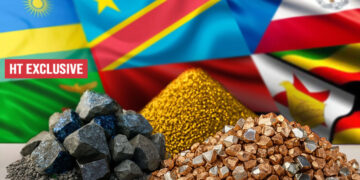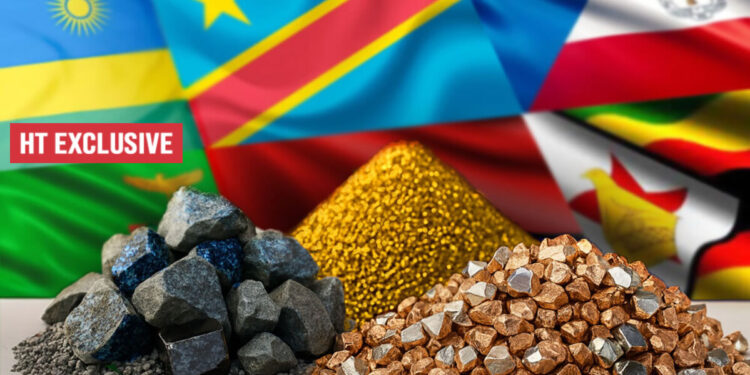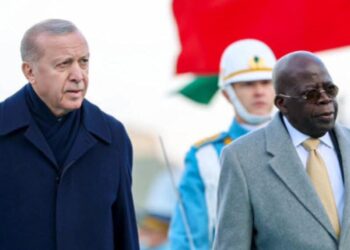By John Ikani
America runs on African minerals. From the cobalt in fighter jets to the platinum in clean energy tech, the US depends on metals dug from African soil. Last year alone, the US bought nearly $89 billion worth of precious metals, many of them mined in places like Congo and South Africa. But now, a new fight is brewing.
President Trump wants to slap tariffs on imported minerals, claiming foreign producers are manipulating prices. The real target? China, which refines most of the world’s cobalt and rare earth metals.
However, if America taxes these imports, it could backfire. US factories need these materials now, not whenever domestic mines can catch up.
Africa, meanwhile, sees a chance to finally demand a fairer deal. For too long, raw minerals have been shipped out, refined abroad, and sold back at a premium. Now, African nations are pushing hard to keep processing and profits on their own soil.
The African Union has a new plan: no more exporting raw ore unless companies build refineries locally. Whether the next chapter is a win-win partnership or a fresh resource grab will be decided in the next twelve months.
Full Story
In 2024, the United States imported precious metals worth about $89 billion, making them one of the country’s top ten import categories.
A sizeable slice of those ingots and ore bags started their journey in African mine shafts, from South Africa’s platinum belt to Congo’s copper-cobalt heartland, even though official tallies often hide that fact once the raw rock is processed or re-exported through China.
America’s dependence runs deeper than jewellery. The latest US Geological Survey report confirms that the country was “100 percent import-reliant” for twelve critical minerals in 2024 and more than 50 per cent reliant for another twenty-eight.
Cobalt keeps F-35 jet engines from melting; manganese hardens every tonne of US-made steel; platinum group metals scrub exhaust fumes and power next-gen fuel cells.
Yet, on 15 April 2025, President Trump signed an executive order directing Commerce Secretary Howard Lutnick to examine tariffs on all processed critical-mineral imports under Section 232 of the Trade Expansion Act.
The White House framed the move as a blow against “price manipulation” by foreign producers, a veiled swipe at China, which refines most of the world’s cobalt and rare earths. Executives in Detroit and Silicon Valley immediately warned that raising border taxes would push up input prices at home faster than domestic mines can fill the gap.
Sensing both risk and opportunity, Africa is pushing back with its own playbook. The African Union last month adopted a Green Minerals Strategy that explicitly calls for value-addition “at source” before any ore crosses an ocean.
Governments from Zambia to Tanzania are drafting laws that bar the export of unprocessed battery minerals unless investors build smelters on African soil. Analysts at the Peterson Institute say Washington’s idea of tying mineral deals to military aid, already floated in Congo, could “backfire” by deepening conflict instead of development if transparency is lacking.
That warning lands as Senior Advisor Massad Boulos returns from an eight-day sprint through Kinshasa, Kigali, and Nairobi. In Congo, he unveiled what diplomats are calling the “Congo Compact”, which is billions of dollars in US equity and counter-insurgency training in exchange for priority access to cobalt and copper concessions.
President Félix Tshisekedi welcomed the pitch but hinted any final deal must leave refining jobs on Congolese ground, a stance aligned with the AU blueprint.
Elsewhere on the continent, fresh alliances are forming. In Kenya, a Perth-Nairobi consortium backed indirectly by the US has moved to secure the Mrima Hill rare-earth deposit, a play that coincided with Washington elevating Kenya to “major non-NATO ally” status.
South Africa, still America’s number-one African mineral supplier despite a bitter diplomatic spat, has warned that any tariff on platinum group metals would be “economic self-harm” for both countries.
Industry veteran Gwede Mantashe, now South Africa’s Resources Minister, spelled it out at February’s Mining Indaba: if tariffs bite, Pretoria could simply divert shipments to BRICS partners who pay in hard cash and ask fewer questions.
Market reality supports him, as China already scoops up more than 70 percent of Congo’s cobalt and processes it into battery chemicals before re-exporting to the United States.
For now, trade continues to flow, but deadlines loom. Commerce has six months to finish its Section 232 investigation. By then, the first AU-backed Critical Minerals Summit will have met in Nairobi to hammer out minimum in-country processing targets, and US manufacturers’ stockpiles of cobalt and manganese will be running low.
Lobbyists on both sides of the Atlantic predict bruising negotiations before Christmas, with Washington under pressure to carve out “national-security exemptions” for friendly suppliers and African capitals determined not to miss this once-in-a-generation leverage window.
If the two sides strike a smarter bargain—one that swaps raw-ore dependency for joint refineries and battery plants—Africa could finally capture more wealth from its rocks while the United States safeguards its supply chain. If they fail, tariffs may raise prices, deepen mistrust, and hand even greater influence to Beijing.
Either way, the clock is ticking, and the next twelve months will show whether the new minerals race ends in partnership or stalemate.



































